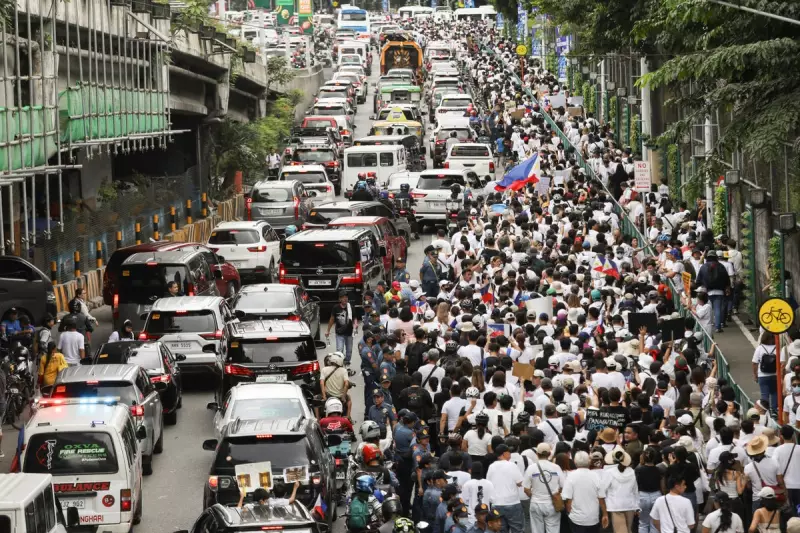
Tens of thousands of demonstrators have flooded the streets of Manila in a dramatic show of public anger over a deepening corruption scandal involving flood control projects in one of the world's most typhoon-vulnerable nations.
Massive turnout for anti-corruption rally
Police estimated that nearly 130,000 members of the influential Iglesia Ni Cristo (Church of Christ) had gathered in Manila's Rizal Park by mid-afternoon on Sunday, marking the beginning of a three-day protest demanding accountability. Many participants dressed in white and carried placards condemning corruption as the religious group, known for voting as a bloc and being courted by politicians during elections, made its voice heard.
Additional protest groups were scheduled to assemble later at the iconic "People Power" monument in Quezon City, echoing the spirit of previous popular movements that have shaped Philippine politics.
Security measures and previous violence
Authorities have implemented extensive security precautions, with thousands of police and military personnel deployed across the capital. According to a confidential security assessment obtained by the Associated Press, the government anticipated peaceful demonstrations despite the massive turnout.
The presidential palace itself entered security lockdown over the weekend, with major access roads blocked by anti-riot police, cargo containers and barbed wire. This cautious approach follows violent clashes during a 21 September anti-corruption protest where over 100 police officers were injured after being attacked with rocks, bottles and firebombs by hundreds of black-clad demonstrators near the presidential palace.
National police chief Lt Gen Jose Melencio Nartatez Jr has instructed law enforcement to exercise "maximum tolerance" during the current rallies, reflecting the delicate balance between maintaining order and respecting democratic rights to protest.
The flood control corruption scandal
At the heart of the public outrage lies a disturbing revelation: thousands of flood defence projects across the Philippines were found to be substandard, incomplete or entirely non-existent despite substantial government funding. The scandal emerges in a country frequently battered by deadly typhoons, where effective flood control can mean the difference between life and death for vulnerable communities.
During senate hearings and investigations by a fact-finding commission, government engineers, public works officials and construction company executives testified under oath that lawmakers and public works department officials accepted bribes from construction firms. These illicit payments allegedly helped companies secure lucrative contracts while avoiding accountability for shoddy work, though most accused individuals have denied the allegations.
The timing of the scandal could hardly be more sensitive, coming just weeks after two typhoons left at least 259 people dead this month, primarily from flash floods and landslides, while forcing millions to evacuate their homes.
Political ramifications and presidential response
President Ferdinand Marcos Jr faces mounting pressure to address both the corruption allegations and the growing street protests. In a bold statement last week, President Marcos declared that many implicated lawmakers and wealthy businesspeople would be in jail by Christmas, seeking to reassure an increasingly sceptical public.
The president revealed that an independent fact-finding commission he established has already filed criminal complaints for graft, corruption and plunder against 37 suspects. Additional complaints have been lodged against 86 construction company executives and nine government officials for allegedly evading nearly 9 billion pesos (£116 million) in taxes.
Among those implicated are both political allies and opponents of President Marcos, including:
- Former House of Representatives speaker Martin Romualdez, the president's cousin and key ally
- Former Senate president Chiz Escudero
- Senator Bong Go, a prominent supporter of former president Rodrigo Duterte
All have vigorously denied any wrongdoing.
Deepening political divisions
The scandal has exposed and exacerbated existing political fractures within the Philippine establishment. Former president Rodrigo Duterte, a harsh critic of Marcos currently detained by the International Criminal Court in The Hague for alleged crimes against humanity related to his anti-drug campaigns, finds his legacy further entangled in the controversy.
Mr Duterte's daughter, the current vice president, has argued that President Marcos should also face accountability and potential imprisonment for approving the 2025 budget that allocated billions for the now-questioned flood control projects.
Some isolated voices, including supporters of Mr Duterte, have called for the military to withdraw its support from President Marcos. However, Armed Forces of the Philippines chief of staff General Romeo Brawner Jr has firmly rejected such suggestions, stating: "With full conviction, I assure the public that the armed forces will not engage in any action that violates the constitution. Not today, not tomorrow and certainly not under my watch."
As the protests continue and investigations deepen, the Philippines faces a critical test of its democratic institutions and anti-corruption mechanisms, with vulnerable communities waiting to see whether their flood protection will finally receive the attention and integrity they desperately require.





